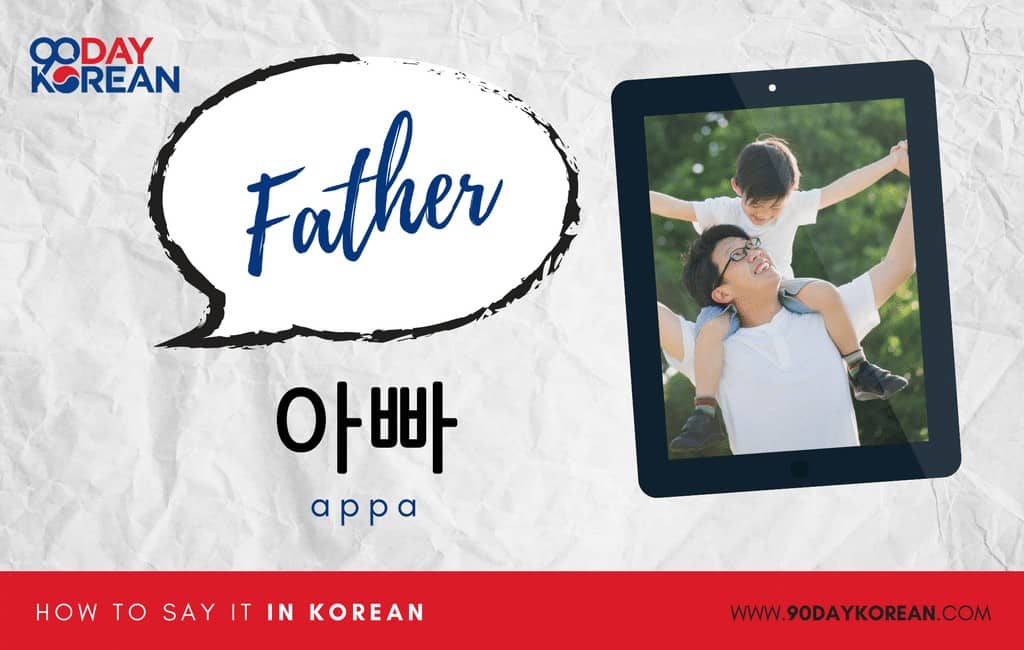Understanding "Father" In Korean: A Comprehensive Guide To Family Terms And Cultural Insights
Learning how to say "father" in Korean is a fundamental step in understanding Korean family values and language structure. Whether you're a language enthusiast, a traveler planning to visit South Korea, or simply interested in Korean culture, mastering this term will enhance your linguistic skills and cultural appreciation. This article will delve into the various ways to express "father" in Korean, including formal and informal terms, cultural implications, and practical usage.
The Korean language is rich with nuanced expressions, especially when it comes to family terms. Knowing the correct word for "father" can help you communicate effectively in different contexts, from casual conversations with friends to formal interactions with elders. As we explore the various terms used to refer to fathers in Korean, we'll also discuss the importance of honorifics and respect in Korean culture.
This guide aims to provide a comprehensive understanding of the word "father" in Korean, including its variations, cultural significance, and practical applications. By the end of this article, you'll not only know how to say "father" in Korean but also appreciate the deeper cultural meanings behind these terms.
Read also:Emmett J Scanlan The Life And Achievements Of A Remarkable Leader
Table of Contents
- Biography of Key Terms
- Basic Term for Father in Korean
- Formal Terms for Father in Korean
- Informal Terms for Father in Korean
- Cultural Context of Father in Korean
- Usage Examples in Everyday Conversations
- Understanding Honorifics in Korean
- Tips for Learning Korean Family Terms
- Related Family Terms in Korean
- Common Mistakes to Avoid
- Conclusion
Biography of Key Terms
In Korean, the term for "father" varies depending on the context and level of formality. Below is a table summarizing the most common terms used to refer to "father" in Korean:
| Term | Meaning | Context |
|---|---|---|
| 아버지 (Abeoji) | Father (formal) | Used when speaking about one's own father in formal settings. |
| 아빠 (Appa) | Father (informal) | Used when speaking directly to one's father in casual settings. |
| 할아버지 (Harabeoji) | Grandfather | Refers to the father's father. |
| 외할아버지 (Oe-harabeoji) | Maternal grandfather | Refers to the mother's father. |
Basic Term for Father in Korean
The most basic term for "father" in Korean is 아버지 (Abeoji). This term is commonly used in formal settings or when referring to one's father in third-person contexts. For example, if you're talking about your father to someone else, you would use "아버지" to show respect and formality.
While "아버지" is the standard term, it's important to note that Korean language emphasizes context and relationship dynamics. Depending on the situation, other variations of "father" may be more appropriate.
Why "아버지" is Important
- It reflects the hierarchical nature of Korean society.
- It is used in formal and semi-formal conversations.
- It demonstrates respect and politeness.
Formal Terms for Father in Korean
In Korean culture, respect for elders is deeply ingrained. When addressing or referring to one's father in formal settings, it's essential to use appropriate terms that convey respect. One of the most formal terms for "father" is 아버님 (Abeonim).
This term is often used in situations where a higher level of respect is required, such as in business settings or when speaking to someone outside the family about one's father. Using "아버님" shows a deeper level of reverence and is a sign of good manners.
Examples of Formal Usage
- When introducing your father to a colleague: "This is my 아버님."
- When writing a formal letter: "I hope my 아버님 is in good health."
Informal Terms for Father in Korean
For more casual and intimate settings, Koreans often use the term 아빠 (Appa) to refer to their father. This term is similar to "dad" or "papa" in English and is used when speaking directly to one's father or within the family.
Read also:Bella Poarch Leak The Truth Behind The Viral Sensation
Using "아빠" creates a warm and familiar atmosphere, making it ideal for everyday conversations with family members. However, it's important to note that this term should only be used in informal contexts and not in formal or professional settings.
When to Use "아빠"
- When talking to your father directly.
- When discussing your father with close friends or siblings.
Cultural Context of Father in Korean
The concept of "father" in Korean culture goes beyond mere terminology. In Korean society, fathers are often seen as the head of the household and play a crucial role in family dynamics. Respect for parents, especially fathers, is a core value that is reflected in language and behavior.
Understanding the cultural context of "father" in Korea can help you appreciate the nuances of the language and better navigate social interactions. For example, addressing one's father with the correct term is a sign of respect and adherence to cultural norms.
Key Cultural Insights
- Fathers are traditionally seen as providers and protectors.
- Respect for elders is emphasized in all aspects of life.
- Language reflects the hierarchical structure of Korean society.
Usage Examples in Everyday Conversations
Learning how to use "father" terms in real-life situations can enhance your communication skills in Korean. Below are some examples of how these terms might be used in everyday conversations:
Formal Context
Friend: "Who is the man in the photo?"
You: "That's my 아버님. He's a professor at the university."
Informal Context
Sibling: "What is 아빠 doing today?"
You: "아빠 is working in the garden."
Understanding Honorifics in Korean
Honorifics are an integral part of the Korean language, and they play a significant role in how family terms are used. Honorifics are used to show respect and maintain social harmony, especially in hierarchical relationships like those between parents and children.
In the case of "father," using the appropriate honorific can demonstrate your understanding of Korean cultural values. For example, using "아버님" instead of "아버지" in formal settings shows a higher level of respect and politeness.
Types of Honorifics
- Basic honorifics: Used in everyday conversations.
- Formal honorifics: Used in professional or ceremonial settings.
- Intimate honorifics: Used within close family or friend groups.
Tips for Learning Korean Family Terms
Learning Korean family terms, including those for "father," can be challenging but rewarding. Here are some tips to help you master these terms:
- Practice using the terms in different contexts to understand their nuances.
- Engage in conversations with native speakers to improve your pronunciation and usage.
- Study the cultural significance of each term to deepen your understanding.
Recommended Resources
- Korean language textbooks with cultural notes.
- Online language courses that focus on conversational Korean.
- Cultural exchange programs to experience Korean family dynamics firsthand.
Related Family Terms in Korean
Beyond "father," there are many other family terms in Korean that are worth exploring. Understanding these terms can provide a more comprehensive view of Korean family structures and relationships. Below are some related terms:
- 어머니 (Eomeoni): Mother (formal)
- 엄마 (Eomma): Mother (informal)
- 형 (Hyung): Older brother (used by males)
- 오라버니 (Orabeoni): Older brother (used by females)
Common Mistakes to Avoid
When learning Korean family terms, it's easy to make mistakes, especially if you're unfamiliar with the cultural context. Here are some common mistakes to avoid:
- Using informal terms in formal settings.
- Forgetting to use honorifics when necessary.
- Mispronouncing terms due to lack of practice.
How to Avoid Mistakes
- Study the context in which each term is used.
- Seek feedback from native speakers to improve your usage.
- Practice regularly to build confidence and accuracy.
Conclusion
Learning how to say "father" in Korean is more than just memorizing a word; it's about understanding the cultural and linguistic nuances that shape Korean family dynamics. By mastering terms like "아버지" and "아빠," you can communicate effectively and respectfully in various contexts.
We encourage you to practice these terms in real-life situations and explore related family terms to deepen your understanding of Korean culture. Don't forget to share your experiences and insights in the comments section below. If you enjoyed this article, consider exploring other topics on our site to enhance your knowledge of the Korean language and culture.


